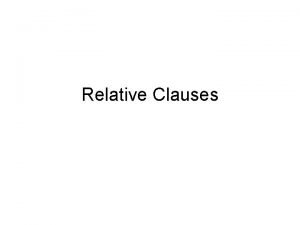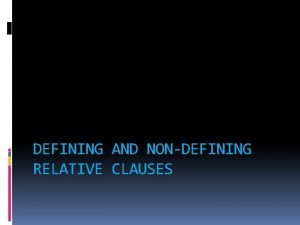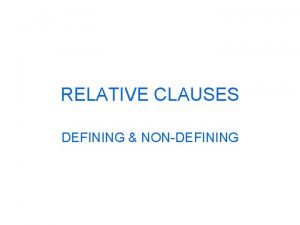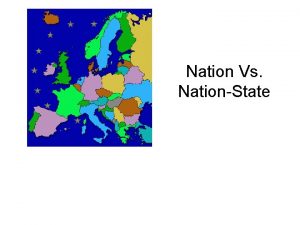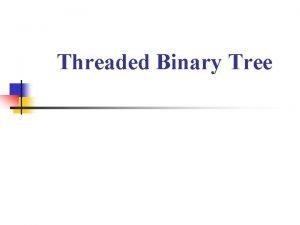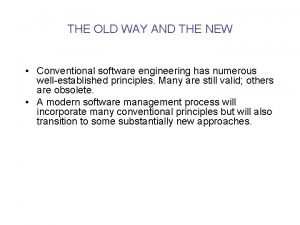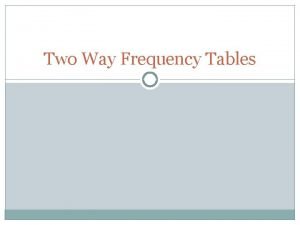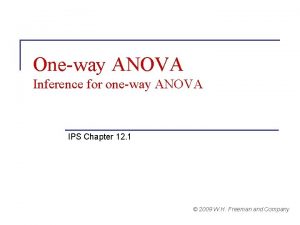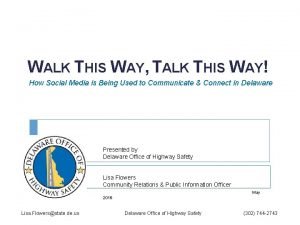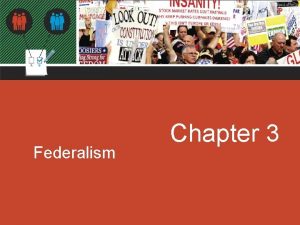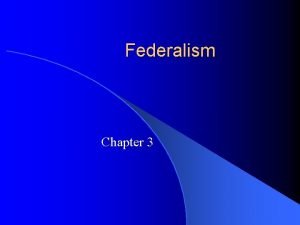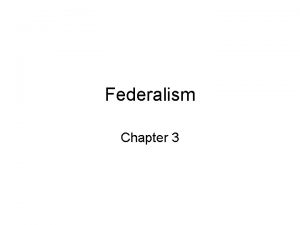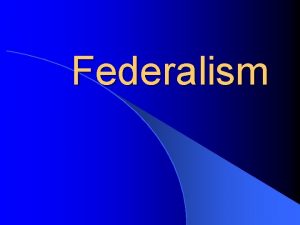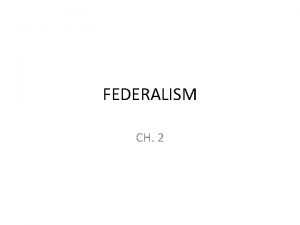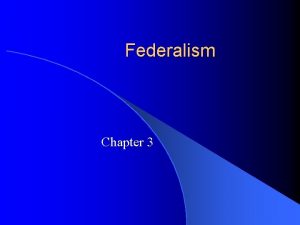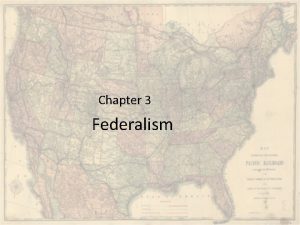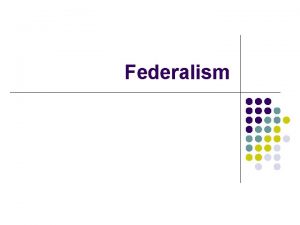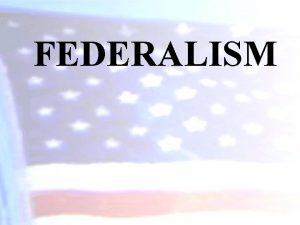Federalism Defining Federalism way of organizing a nation















- Slides: 15

Federalism

Defining Federalism- way of organizing a nation so that two or more levels of government have formal authority over the same area and people � Unitary government- all power resides with in the central government � Confederation- national government weak, all power in hand of countries components (state or territories) � Intergovernmental relations- set of interactions among national , state, and local governments, including regulations, transfer of funds, and sharing of information �

Division of power All states have equal representation in the senate (Article V) it is unamendable � Limit of state foreign policy, economic matters, and basic rights such as voting rights � Overlapping responsibilities in law and order, health safety, and regulating financial institutions �

National Supremacy � � � Supremacy clause (Article VI)- Three items the law of the land 1. The Constitution 2. Laws of the national government (when consistent with the constitution) 3. Treaties (which can be made only by the national government) Disputes of education regulation, health care but federal government usually wins

The Civil War Struggle over states rights to have slavery � National government had to assert power over southern states claim to sovereignty �

Struggle for Racial Equality � � � 1954 Brown v Board of Education of Topeka Ended segregation Governor of Alabama literally blocked school entrance National guard ad US Marshals used to enforce Additional national policies used for racial equality

Tenth Amendment “power not delegated to the United States by the Constitution, nor prohibited by it to the states, are reserved to the states respectively, or to the people” � United States v. Darby(1941)- state powers are not superior to those of national government � Bond v. United States (2011)- person indicted under a federal statute may challenge the statute on 10 th amendment grounds �

Implied Powers Mc. Culloch v. Maryland(1819)- states can’t tax the national government › 1. “the government of the United states. Though limited in its power, is supreme within its sphere of action › 2. national government has certain implied powers that go beyond its enumerated powers � Necessary and proper clause(Article I sec. 8)- elastic clause �

Commerce Power Congress had power to promote economic development � Power to regulate economy � Gibbons v. Ogden(1824) commerce broadly defined to all forms of commercial activity �

State Obligations to each other Full Faith and Credit(Article IV) › Given to public records, acts and judicial proceedings from other states � Extradition � Privileges and immunities › Receive benefits of state you are currently in › Ex. gambling in Nevada �Does not count for voting or tuition � Saenz v. Roe- ruled Cali could not require new residents to wait a year before receiving welfare �

From Duel to Cooperative Federalism Dual Federalism- national government and states remain supreme within their own sphere � Cooperative federalism- national government and states share powers and policy assignments � As a nation we have moved more from dual to cooperative � › Shared Costs › Federal Guidelines › Shared Administration

Devolution? � � � Democrats generally support a strong national government Republicans generally support states rights Devolution- transferring of responsibility for policies from the federal government to state and local Devolution began in 1994 Republicans changed approach in 2000 to using the federal government to accomplish objectives

Fiscal Federalism Fiscal federalism-federal funds used by national government to both aid and influence states and localities � The Grant system � › Categorical Grants- used only for specific purposes �Project Grants- based on competitive applications �Formula Grants- distributed based on pop. , per capital, rural pop. › Block Grants- given automatically to states to use at their discretion

Fiscal Federalism � Scramble for federal dollars › › � $600 billion in grants at stake- staffs placed in Washington to track money Universalism- something for everyone The Mandate Blues › Mandate- requirements that direct states to provide additional benefits or receive penalty or not get aid › Medicaid- expanded to children, pregnant, elderly poor (mostly funded by US) › No child left behind- if no improvement schools lose money � Unfunded mandates (or insufficient funds) › Americans with disabilities act › Clean Air Act › Courts

Diversity in Policy � States as policy innovators › Test public policies � Funds distributed differently › Ex. Education Vermont$18, 913 per student › Arizona $6, 385 per student
 Defining and non-defining relative clauses arasındaki fark
Defining and non-defining relative clauses arasındaki fark Relative clauses defining and non defining
Relative clauses defining and non defining Essential relative clause
Essential relative clause Defining and non defining relative clauses
Defining and non defining relative clauses Defining and non defining relative clauses in telugu
Defining and non defining relative clauses in telugu Defining relative clauses examples
Defining relative clauses examples Theories of origin of state
Theories of origin of state State vs nation
State vs nation State vs nation
State vs nation What is threaded binary tree
What is threaded binary tree Conventional software
Conventional software Perbedaan anova one way dan two way
Perbedaan anova one way dan two way Bottle of rum to fill my tum
Bottle of rum to fill my tum How to do a two way frequency table
How to do a two way frequency table What does one way anova tell you
What does one way anova tell you Talk this way
Talk this way
